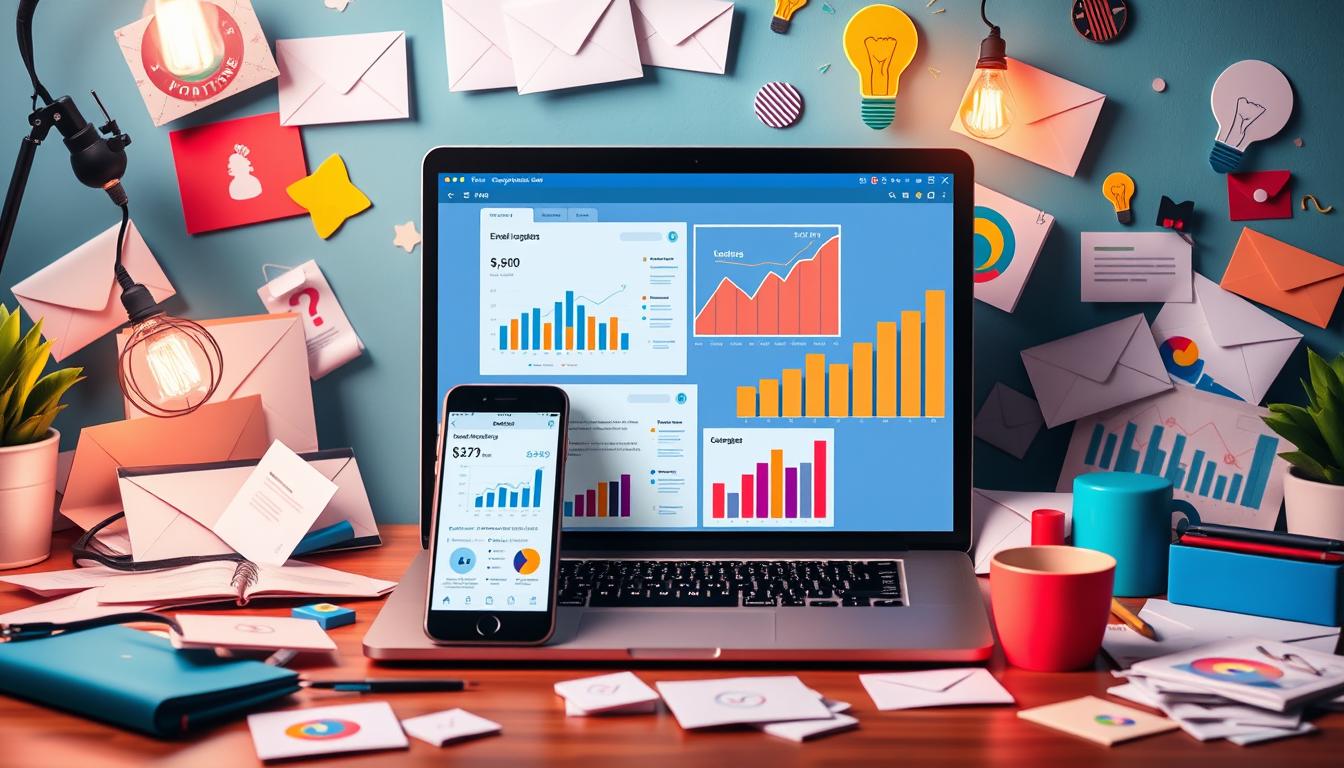Starting your own email marketing business? You might wonder what it is and how it can grow your brand. Email marketing is a strong tool for reaching customers and boosting sales. Gary Thuerk’s first commercial email made $13 million, showing its value. Today, 333 billion emails are sent daily, making it key for digital marketing.
An email marketing business sends out emails to engage customers and promote products. Learning about it, you’ll see how to grow your list, write great emails, and use services to increase growth. With 93% seeing email as their main digital marketing, the chances for success are huge.
Exploring email marketing, you’ll find out about different types like welcome emails and newsletters. You’ll also learn about following email laws, like the CAN-SPAM Act, to keep your services effective and legal. Knowing the basics of an email marketing business will help you build a successful one that brings real results.
Understanding Email Marketing Business Fundamentals
Email marketing is key to success. It helps build strong bonds with your audience. It also drives traffic to your sites.
Definition and Core Concepts
Email marketing sends custom messages to specific groups. It uses personal touches and automation to keep people engaged. Personalized emails can lead to sales six times more than generic ones.

The Role of Email Marketing in Digital Strategy
Email marketing boosts lead generation and keeps customers coming back. It offers a high return on investment, with $42 for every $1 spent. Also, 80% of experts say it makes customers more loyal.
Key Components of Email Marketing Services
Key services include managing your email list and creating content that speaks to your audience. You also need to track how well your campaigns are doing. Using segments can increase your open rate by 14.31%, making your campaigns more effective.
The Evolution of Email Marketing in Modern Business
Email marketing has changed a lot over the years. In 1978, Gary Thuerk sent the first mass email, making about $13 million. This showed how powerful email could be for marketing.

As technology got better, so did email marketing. In the late 1990s, Microsoft’s Outlook and Hotmail made free email easy to get. By 2023, almost 4.4 billion people use email, and that number is expected to grow.
Responsive designs in 2009 made emails more effective. Now, about 42% of emails are opened on mobiles. This means emails need to work well on phones. Companies use AI and automation to make emails more personal and engaging.
Rules like GDPR have also changed how we use email. Now, marketers must get permission before sending emails. This has made emails more personal and fun, with things like polls.
Email marketing has grown and changed a lot. It shows how flexible and valuable it is. Today, companies keep finding new ways to use email, making it a key part of digital marketing.
Essential Components of an Email Marketing Business
Starting an email marketing business needs a solid base. This base ensures your campaigns work well and reach the right people.
Infrastructure Requirements
Having reliable email marketing tools is key. You need strong email servers, marketing automation, and CRM systems. These handle lots of emails and customer data.
Platforms like Mailchimp and HubSpot are great. They bring all these parts together smoothly.
Technical Skills Needed
You need skills in HTML coding for email design, data analysis for understanding results, and copywriting for writing great content. These skills help make your emails interesting and improve your campaigns based on how they do.
Business Model Options
There are many ways to run your business. You can offer full-service email marketing or focus on specific areas like e-commerce or B2B services. This way, you can give email marketing tips and solutions that fit each client’s needs.
Building Your Email Marketing Service Portfolio
Creating a wide range of email marketing services is key for any top email marketing company. By having different types of campaigns, you can meet the unique needs of various clients and sectors.
Begin with newsletter creation, which keeps clients’ audiences informed and engaged. Automated drip campaigns are also great, helping businesses guide leads with targeted emails. Transactional emails, like order confirmations, are vital for a better customer experience.
Effective packaging and pricing can draw in more clients. Offer tiered packages that mix different services, giving flexibility and value. Keep your portfolio fresh with the latest trends and tech to stay ahead.
Expanding your services meets changing client needs and makes your email marketing company a go-to solution. Being flexible and creative builds a strong portfolio that leads to lasting success.
Email Marketing Tools and Technologies
Choosing the right email marketing tools is key for your business’s success. With over 4.3 billion email users worldwide, the right platforms can boost your outreach and engagement.
Popular Email Marketing Platforms
Mailchimp, Klaviyo, and Mailmodo are top picks for businesses of all sizes. Mailchimp is great for beginners with its easy-to-use interface and strong features. Klaviyo is perfect for e-commerce with its focus on personalization. Mailmodo stands out for its interactive emails, which can really increase engagement.
Automation Software Options
Automation software makes your email campaigns run smoother, saving you time and boosting efficiency. Tools like HubSpot and ActiveCampaign let you set up automated workflows. This ensures you’re always in touch with your audience, nurturing leads and keeping customers happy.
Analytics and Tracking Tools
It’s vital to measure how well your campaigns are doing. Tools like Google Analytics and analytics built into platforms give you insights. You’ll learn about open rates, click-through rates, and conversions. Using these metrics, you can tweak your strategies and make your email marketing tips even better.
Developing Effective Email Marketing Strategies
Creating strong email marketing strategies is key for any business. First, set clear goals that match your business aims. It’s vital to know your audience well. This knowledge helps you craft your email marketing campaign just right.
There are many types of email campaigns. A welcome series can grab new subscribers’ attention. Promotional emails can boost sales during big events. Re-engagement emails are great for getting back in touch with inactive customers.
Personal touches, like using the recipient’s first name in the subject line, can raise open rates by up to 14%. This shows how small changes can make a big difference.
To make sure your emails land in the inbox, not the spam folder, keep your list clean. Use trusted email service providers. Make your content engaging and relevant to your audience. Try different versions of your emails with A/B testing to keep improving.
Segmenting your email list is another smart move. This means dividing your list based on things like where people are or what they’ve bought. It can increase your email revenue by 760%. Also, send emails when your audience is most likely to check them, like in the morning when 58% of people first check their phones.
Monetization Models for Your Email Marketing Business
Choosing the right way to make money is key for your email marketing business. Knowing the different pricing options and how they fit your goals can help you earn more.
Service-Based Pricing Structures
Service-based pricing means you charge for specific services. You can charge per email, per subscriber, or use tiered pricing. For example, a tiered model offers different packages for various needs and budgets.
This approach can attract more clients and boost your earnings.
Retainer vs. Project-Based Models
Choosing between a retainer and project-based model depends on your strategy. A retainer model gives you steady income each month, helping with financial stability. On the other hand, project-based pricing can mean higher fees for each project.
It’s good for short-term, big-effort campaigns. Think about your workload and what your clients want to pick the best option.
Scaling Your Revenue
To grow your income, expand your services and reach more people. You can upsell by adding premium analytics or custom campaign plans. Offer special features and partner with other businesses.
Oberlo says email marketing has a high return on investment. This makes it a great way to grow your email marketing business.
Legal Compliance and Best Practices
It’s vital for your email marketing company to follow the law. This builds trust and keeps you out of trouble. Knowing the rules is key to doing well in email marketing.
CAN-SPAM Act Requirements
The CAN-SPAM Act says you must honor opt-out requests in ten days. You can’t use misleading subject lines, and you must clearly show who sent the email. Breaking these rules can cost up to $50,120 for each email.
GDPR Considerations
The General Data Protection Regulation (GDPR) requires clear consent before using personal data. This consent must be clear and separate from other terms. Not following this can lead to fines of up to €20 million or 4% of your global revenue. Using double opt-in helps you stay compliant and boosts engagement.
Data Protection Guidelines
Keeping your email list up to date helps avoid bounces and improves delivery. Use approved ways to move personal data across borders, like Standard Contractual Clauses (SCCs). Emails that follow the rules tend to get more opens and clicks, making your marketing better.
Measuring Success in Email Marketing
Tracking your email marketing campaign is key to improving your email marketing strategies. Start by looking at the open rate. This shows how many people opened your emails. A high open rate means your subject line is catchy or your brand is well-known.
Then, check the click-through rate (CTR). This tells you how many people clicked on links in your email. It shows which parts of your campaign your audience likes best.
Also, look at the conversion rate. This shows how many people did what you wanted them to, like buying something or signing up for an event. This KPI is important for seeing how your email marketing campaign helps your business.
Don’t forget about the bounce rate and unsubscribe rate. A low bounce rate keeps your sender reputation good. Watching unsubscribes helps you see if your content or email frequency is off. By checking these metrics often, you can make smart choices to improve your email marketing strategies.
Common Challenges and Solutions in Email Marketing Business
Running an email marketing business has its ups and downs. Knowing these challenges and using smart email marketing tips can help you overcome them.
Deliverability Issues
Getting your emails into the inbox is key. Keep your email list clean by removing old contacts. Use SPF and DKIM to fight spam.
Make your emails personal and mobile-friendly. This helps them land in the inbox.
Client Management
Managing what clients expect is vital for good relationships. Set clear goals and keep them updated on your work. Quick responses and clear reports build trust.
Campaign Optimization
Always look for ways to make your email campaigns better. Test different subject lines and content with A/B testing. Look at your email stats to see what works.
By doing this, you can meet changing customer needs and improve your results.
Conclusion: Starting Your Email Marketing Business Journey
Understanding what an email marketing business is is the first step. The industry is booming, with revenue expected to hit $11 billion by 2023. It’s a cost-effective way to invest in your business, with a high return on investment.
With 4.48 billion email users worldwide, your reach is huge. Personalized emails can greatly increase engagement. This leads to more sales and stronger customer ties.
Starting your own email marketing business means always learning and adapting. Use advanced tools to automate and analyze your campaigns. This keeps you competitive. Focus on segmenting your audience and delivering dynamic content to improve customer experiences and sales.
Email marketing does more than just sell. It builds trust and loyalty through regular, relevant communication. By using effective strategies and following legal standards, you can overcome challenges and make your campaigns more effective.
As you start your email marketing business journey, remember dedication and planning are essential. Seize growth opportunities, use email marketing’s benefits, and take steps to build a successful business.
FAQ
What is an email marketing business?
An email marketing business helps clients with their email campaigns. They build subscriber lists, design email content, and use email to engage customers. They use strategies like segmentation and automation to meet marketing goals.
What services do email marketing companies typically offer?
These companies create newsletters, automated campaigns, and transactional emails. They manage lists, create content, and analyze performance. They also offer strategic advice to fit each client’s needs.
How have email marketing strategies evolved over time?
Email marketing has grown from simple texts to advanced campaigns. New technology allows for interactive content and personalization. This makes email marketing better for lead generation and customer retention.
What are the key benefits of using email marketing?
Email marketing is cost-effective and has a high ROI. It lets you directly reach your audience. You can personalize messages and track results to improve your campaigns.
What tools and technologies are essential for an email marketing business?
Key tools include email platforms, automation software, CRM systems, and analytics tools. These help streamline operations and improve campaign results.
How can I develop effective email marketing strategies?
Start by setting clear goals and understanding your audience. Create compelling content and segment your list. Personalize messages, automate workflows, and test your campaigns to improve results.
What are the common monetization models for an email marketing business?
Businesses use per-email pricing, per-subscriber fees, and tiered pricing. They can offer ongoing services or specific campaigns. Upselling and premium features help increase revenue.
How do email marketing businesses ensure legal compliance?
They follow laws like the CAN-SPAM Act and GDPR. This means getting consent, handling unsubscribes, and keeping data private. Staying updated with laws and protecting data builds trust.
What metrics are important for measuring the success of email marketing campaigns?
Important metrics include open rates, click-through rates, and ROI. Bounce rates and customer lifetime value also provide insights. Using these metrics helps improve campaigns and show their value.
What are some common challenges in running an email marketing business and how can they be addressed?
Challenges include deliverability issues and campaign optimization. Improve inbox placement and avoid spam filters for deliverability. Manage clients well and test your strategies to optimize campaigns. Integrating email with other channels can also boost effectiveness.
